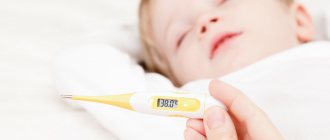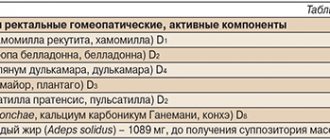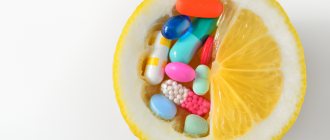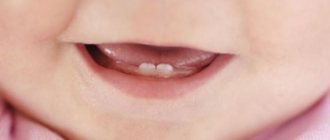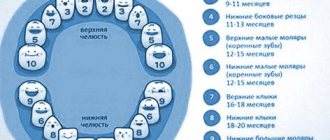When and in what order do baby teeth emerge?
For most children, the teething pattern looks like this:
- At 6-8 months, two central lower incisors appear.
- At 8-9 months, the upper central incisors.
- At 9-12 months, the upper lateral incisors erupt.
- At 11-12 months, the lower lateral incisors.
- At 12-15 months, the upper and lower molars.
- At 16-18 months, the upper canines
- At 18-20 months, the lower canines.
- Chewing teeth erupt at 2-3 years of age.
During normal development, baby teeth erupt in each area within 2-10 days, and the most unpleasant symptoms usually appear within 2-5 days. All 20 baby teeth erupt by age 3.
What to do if teeth are cut chaotically and behind schedule?
There is no need to sound the alarm right away. In some children, teething begins at 3 months, and in some at 10, and this is not a pathology, but a feature of the body. The same applies to the violation of the order of appearance of the incisors.
But if there is a delay of 3-5 months, you need to go for a consultation with a pediatrician or dentist.
Compound
| Ointment for local and external use | 1 g |
| active substance: | |
| interferon human recombinant alpha-2 | 40000 IU |
| excipients: tocopherol acetate - 0.02 g; anhydrous lanolin - 0.34 g; medical petroleum jelly - 0.45 g; peach oil - 0.12 g; purified water - up to 1 g |
| Gel for local and external use | 1 g |
| active substance: | |
| interferon human recombinant alpha-2b | 36000 IU |
| excipients: alpha-tocopherol acetate - 0.055 g; methionine - 0.0012 g; benzoic acid - 0.00128 mg; citric acid monohydrate - 0.001 g; sodium tetraborate decahydrate - 0.0018 mg; sodium chloride - 0.004 g; human serum albumin solution 10% - 0.02 g; distilled glycerin (glycerol) - 0.02 g; carmellose sodium - 0.02 g; ethanol 95% - 0.055 g; purified water - up to 1 g |
| Suppositories for rectal use | 1 sup. |
| active substance: | |
| interferon human recombinant alpha-2b | 150000 IU |
| 500000 IU | |
| 1000000 IU | |
| 3000000 IU | |
| excipients: alpha-tocopherol acetate - 0.055/0.055/0.055/0.055 g; ascorbic acid - 0.0054/0.0081/0.0081/0.0081 g; sodium ascorbate - 0.0108/0.0162/0.0162/0.0162 g; disodium edetate dihydrate - 0.0001/0.0001/0.0001/0.0001 g; polysorbate 80 - 0.0001/0.0001/0.0001/0.0001 g | |
| base: cocoa butter and confectionery fat - up to 1 g |
What are the common teething symptoms and what do you recommend?
- Profuse salivation.
One of the most obvious signs is when drool is literally flowing in a stream. Moreover, the symptom may appear a couple of months before the start of eruption.
Saliva should be carefully wiped away as it appears damp towel or napkin so as not to damage the skin. It is best to use wipes that contain xylitol - it prevents the growth of bacteria and the appearance of rashes on the skin.
- A strong desire to put everything in the mouth and chew.
Chewing helps your baby relieve the itching. The main thing is to hide objects that he could accidentally swallow or injure himself.
Lifehack. Bend your index finger and gently insert it into your baby's mouth. If he starts squeezing it with his gums, it means teeth are definitely coming out. If it just sucks, then it’s something else.
- Skin rashes.
A small rash on the cheeks or chin may occur due to skin contact with saliva. On irritated skin you just need to apply baby moisturizer.
ATTENTION! If the rash around the mouth appears without other symptoms of teething, it is better to show the child to the pediatrician!
- The baby cannot suckle normally.
At the peak of feeding, he abandons her and begins to act up. And sometimes he can bite with his gums. In such a situation, there is no need to force the child to eat. Even if he misses 2-3 feedings, nothing bad will happen. When he gets really hungry, he will still take the breast or bottle and eat. If you have no appetite for more than 24 hours, call a doctor.
- Redness and swelling of the gums.
It begins 2-5 days before teeth appear, goes away on its own, you don’t need to do anything.
You can also notice a blue bubble on the gum. This is a eruption hematoma. It occurs as a result of the destruction of small vessels in the gums during tooth eruption. It does not require any specific treatment. It will soon resolve on its own.
Nosological classification (ICD-10)
- A41.9 Septicemia, unspecified
- A49.3 Mycoplasma infection, unspecified
- A59.0 Urogenital trichomoniasis
- A74.9 Chlamydial infection, unspecified
- B00.0 Herpetic eczema
- B00.1 Herpetic vesicular dermatitis
- B18 Chronic viral hepatitis
- B25.9 Cytomegalovirus disease, unspecified
- B34 Viral infection of unspecified localization
- B37.3 Candidiasis of the vulva and vagina (N77.1*)
- G03.9 Meningitis, unspecified
- J06 Acute upper respiratory tract infections of multiple and unspecified localization
- J11 Influenza, virus not identified
- J18 Pneumonia without specifying the pathogen
- N39.0 Urinary tract infection without established location
- N76 Other inflammatory diseases of the vagina and vulva
- O35.3 Fetal injury (suspected) due to maternal viral disease requiring maternal medical attention
- O35.8 Other fetal anomalies and lesions (suspected) requiring maternal medical attention
What are the complications, and when to see a doctor?
| Symptom | Teeth are being cut, there is no need to go to the pediatrician | The disease develops, contact your pediatrician |
| Cough | A coughing attack begins due to excess salivation. The cough is wet and infrequent. | The cough gets worse, does not go away, does not allow the baby to sleep, and prevents him from eating. Doesn't stop for more than 2 days. Breathe heavily. |
| Nasal discharge | Nasal discharge is transparent and watery and disappears by the 4th day. | The runny nose does not go away for the 4th day. Lots of yellow or green discharge. |
| Heat | The temperature does not exceed 38 °C and lasts no more than 2-3 days. Rapidly decreases under the influence of antipyretics. | Fever above 38.5 °C for more than 2 days. Signs of a cold appear (severe cough and runny nose). |
| Loose stools | Lasts less than 72 hours. | Lasts more than 72 hours. |
| Changes in the oral cavity | The gums become swollen and red. | The oral mucosa is covered with white plaque or ulcers. |
Pharmacodynamics
Human recombinant interferon alpha-2b has pronounced immunomodulatory, antiviral, antiproliferative properties, suppresses the replication of RNA and DNA viruses.
The complex composition of the drugs (ointment, suppositories, gel) causes a number of new additional effects: in the presence of antioxidants (tocopherol acetate and/or ascorbic acid), the specific antiviral activity of human recombinant alpha-2b interferon increases, its immunomodulatory effect on T- and B-lymphocytes increases , the level of secretory immunoglobulins of class A increases, the level of immunoglobulin E normalizes, and the functioning of the endogenous interferon alpha-2b system is restored. Ascorbic acid and alpha-tocopherol acetate, being highly active antioxidants, have anti-inflammatory, membrane stabilizing, and regenerating properties. The use of the drug VIFERON® as part of complex therapy makes it possible to reduce therapeutic doses of antibacterial and hormonal drugs, as well as reduce the toxic effects of this therapy.
It has been established that when using the drug VIFERON® there are no side effects that occur with parenteral administration of interferon alfa-2b preparations, and no antibodies are formed that neutralize the antiviral activity of interferon alfa-2b.
What can be done to help a child with severe itching and pain?
- Carry your baby in your arms more often, play with him and distract him.
- Give chilled water in a bottle, cool fruit puree or kefir. The main thing is that the liquid is not too cold, otherwise the baby will catch a cold.
- Massage the gums with a special silicone brush (see picture above) or you can gently use your clean finger.
- Buy your baby a teether and let's chew.
Such devices are made from plastic, rubber, silicone, wood, or a combination of different materials. The surface of the toys should be elastic and uneven to make it easier for the child to scratch the gums. A cooled teether relieves itching better, so it can be placed in the refrigerator to cool for 10-15 minutes. But don't chill it in the freezer!
- Do not use gum gels with lidocaine and benzocaine.
The child has a lot of saliva in the mouth, so gels are not effective during this period. The child swallows most of the gel.
Indications for the drug Viferon®
Ointment
viral (including herpetic) lesions of the skin and mucous membranes of various localizations;
treatment of influenza and acute respiratory viral infections in children over 1 year of age.
Gel
in complex therapy of ARVI, incl. influenza, frequent and prolonged acute respiratory viral infections, incl. complicated by bacterial infection;
prevention of acute respiratory viral infections, including influenza;
in complex therapy of recurrent stenotic laryngotracheobronchitis;
prevention of recurrent stenosing laryngotracheobronchitis;
in complex therapy of acute and exacerbations of chronic recurrent herpetic infections of the skin and mucous membranes, incl. urogenital form of herpetic infection;
in complex therapy of herpetic cervicitis.
Suppositories
In complex therapy:
ARVI, including influenza, incl. complicated by bacterial infection, pneumonia (bacterial, viral, chlamydial) in children and adults;
infectious and inflammatory diseases of newborns, incl. premature babies: meningitis (bacterial, viral), sepsis, intrauterine infection (chlamydia, herpes, CMV infection, enterovirus infection, candidiasis, including visceral, mycoplasmosis);
chronic viral hepatitis B, C, D in children and adults, incl. in combination with the use of plasmapheresis and hemosorption for chronic viral hepatitis of pronounced activity, complicated by cirrhosis of the liver;
infectious and inflammatory diseases of the urogenital tract (chlamydia, CMV infection, ureaplasmosis, trichomoniasis, gardnerellosis, papillomavirus infection, bacterial vaginosis, recurrent vaginal candidiasis, mycoplasmosis) in adults;
primary or recurrent herpetic infection of the skin and mucous membranes, localized form, mild to moderate course, incl. urogenital form in adults.
What should you not do when your baby is teething?
- Strongly touch the child’s gums with your fingers, press on them and pick them out. This can increase pain or cause infection.
- Conduct vaccination, because immune system is weakened during this period .
- Without supervision, allow your child to chew any hard foods that could cause choking.
- Give homeopathic remedies. Not only will they not help the child, but they can cause serious harm.
The eruption of baby teeth is not a problem, but a natural process for a child’s body. But if you are not sure about something, do not hesitate to ask specialists. If you have any questions, write to us on Instagram.
Dosage
Candles will help your child get rid of pain and fever.
Homeopathic medicines can be used for 14 days. However, even homeopathy should be prescribed by a doctor, not an inexperienced parent.
In some cases, pediatricians prescribe the listed suppositories to children whose age has not yet reached 3 months. The treatment of each baby requires an individual approach, but such an important decision should be made by a specialist in the field of pediatrics whether to prescribe suppositories to a newborn or not.
In cases where a 2-month-old baby is teething and severe pain brings agony, the doctor may prescribe a fourth of the suppository every 6-7 hours . This will relieve pain and improve your well-being. Older children are prescribed 1 suppository every 6-7 hours.
In the case when the child’s body temperature reaches 39-40 degrees and does not decrease for a long period of time, and the pain causes irritability and moodiness, the pediatrician may recommend putting suppositories every 30 minutes for a couple of hours. Next, a break must be observed (about 12-14 hours).
Important! You can put no more than 4 candles per day!
